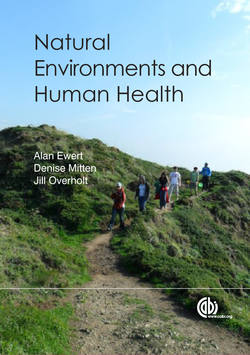Читать книгу Natural Environments and Human Health - Alan W Ewert - Страница 18
На сайте Литреса книга снята с продажи.
Biological connections
ОглавлениеThis section provides information about how humans’ biological functions, including physical health, depend on interactions with nature. Many people, if asked whether humans are connected to nature, would say ‘of course’: we breathe the air, drink water, eat plants and animals, and use minerals and trees for shelters. From a purely utilitarian standpoint, the idea that humans are connected to nature is widely recognized. At the same time, a remarkable number of people in Western countries might at first respond to the question with a shrug or a disinterested attitude. While we depend on nature for our survival it is also true that in Western countries people can go for long periods of time without being in natural environments, which can cause us to lose our cognitive sense of our connection with nature and result in a disconnect from nature that can be harmful for both people and nature. If humans believe that they do not need nature they ignore their impact on nature. This physical separation may lead to the false sense that we are no longer connected to nature or even that we can survive without nature by relying on technology and human ingenuity.
However, humans’ physical connection with nature is ever present though it may be experienced differently, depending on economic status and geographic location. For example, during droughts people with adequate financial resources can afford to eat more expensive imported food. People not able to import food on demand because of economic or other reasons may starve. Ban Ki-moon (2012) tells us: ‘Droughts, such as we have recently seen in the United States, Kazakhstan, Russia, Brazil and India, also raise prices in the marketplace—with potential economic, political and security ramifications’. In 2012, 15 million children worldwide starved primarily due to drought conditions and their parent(s) being unable to buy food. In 2011 in Kenya, Ethiopia, Somilia and Djibouti millions of people starved primarily because of drought (BBC News Africa, 2011). In ecosystems called drylands, such as in the Horn of Africa where Somalia is located, the effects of climate change are particularly evident. The intensifying cycles of extreme drought and flooding in this area caused the need for emergency relief for 10 million people in 2011 (Ki-moon, 2012). These numbers illustrate the very real biological connection we have to the natural world and how we are affected by it.
Climate change is altering the geographic distribution of plants and animals. Mosquitoes, biologically connected to humans because they feed on human blood, have increased their range in recent years leading to an increase in human exposure to malaria, yellow fever, and dengue (Reiter, 2001). Cities such as Nairobi and Aursha were purposefully located at an altitude where the climate was unfavorable for mosquitoes, thus decreasing the risk of infection. Due to a warming climate in that area, over 4 million people who once were not at great risk for malaria now are at risk. Additionally, because there are more human-built heated indoor spaces, mosquitoes now have indoor resting sites and can live longer at higher altitudes. The result has been an increase in the mosquito’s ability to transmit malaria in the East African Highlands (Reiter, 2001). In this case, humans are changing the habitat and behaviors of the insects to our health detriment.
Florence Nightingale, Ellen Swallow, and many others raised concerns about the impact of the environment on human health and disease, especially as it relates to clean water and diseases such as cholera. They helped humans modify their behavior and environment, and improved health. Our biological health is absolutely connected to nature. Humans need clean air to breathe, clean water to drink, and nutritious food to eat. Even Hippocrates talked about the significant effect that ‘airs, waters, and places’ have on human health over time (Philo, 2009). Our connection to nature is such that changes humans make to the natural environment can have positive or negative physical effects on health.
